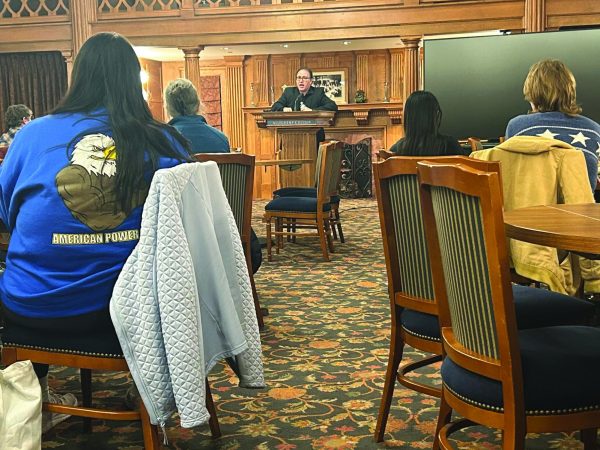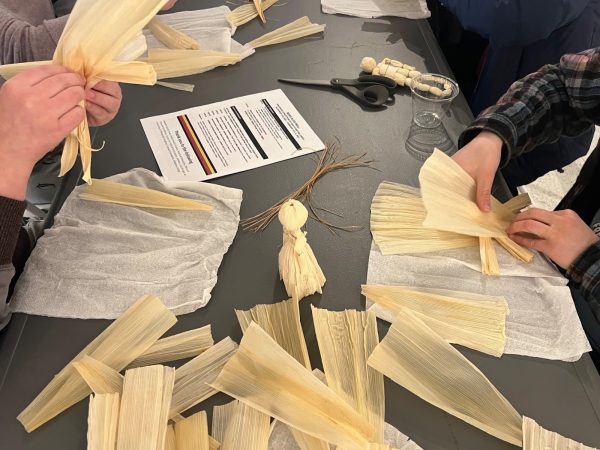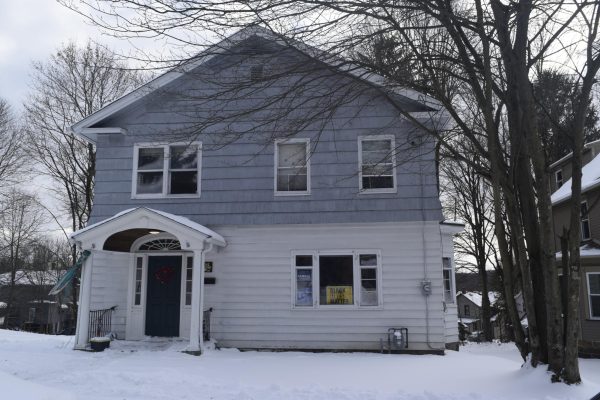Neuroscience Club welcomes interdisciplinary students
The Neuroscience Club is a student organization on campus that focuses on both academics and research opportunities for students interested in neuroscience.
“We are about bringing together people who are interested in neuroscience and psychology so we can have a communal space to discuss our shared interests,” Co-President Jessica Weston, ’22, said.
The organization meets biweekly on Zoom to discuss upcoming virtual events, mentorship and interesting options within neuroscience. There are no set dates for meetings yet, but students will receive an email when they are hosting a meeting. The organization is advised by Assistant Professor of Psychology and Neuroscience Sarah Conklin.
Neuroscience Club is open to any student who is interested in attending the meetings, even if they are not interested in being a neuroscience major.
“We talk about a lot of cool things that you would not even have to be in the sciences to enjoy,” Co-President Emily Hagberg, ’21, said. “We are not diving into really hard neuroscience topics during our meetings, but sometimes they may be brought up. Even as a neuroscience major, your understanding as a first year versus your understanding as a senior are different because you have not been in all of the courses so we do not just discuss difficult topics — we are open to anything.”
The organization is making a transition to become more interactive and less literature-based to increase student participation.
“In previous years, (the neuroscience club) was like a journal club,” Hagberg said. “The neuroscience and psychology departments have made their own neuroscience journalism club where people can go once a month. (For our club) it used to be that you would read a journal and come discuss it when we were not on the executive board, but we have changed that because we realized that (students) did not want to do more homework by reading some difficult scholarly article and show up to discuss.”
The club is in the process of becoming more member-centric where the events represent the desires and interests of the members.
“What we really want is for more people to have a place to share their interests,” Weston said. “If that is by not doing a lot of literature stuff and by doing more event-based activities, then the people have spoken.”
For a senior who attended a meeting as a first-year student, the meetings will be very different from what they experienced in their first year, Hagberg said.
“In the past few years, we have had a declining amount of people attending our events,” Weston said. “We had no budget and our big fundraising event fell apart due to COVID-19, so we want a proper foundation for the neuroscience club going forward. We want as many people as possible to enjoy our club just as they would with any other club with as few snags as possible.”
The organization also wants to establish a budget that will allow all members to attend the neuroscience convention, Hagberg said.
“In years past, there have been issues with funding, and people were not able to attend the neuroscience convention,” Hagberg said. “While this year it will not be hosted due to (COVID-19), we are still going to secure this funding in our budget for future neuroscience club members.”
The club has an event planned with Professor of Biology and Neuroscience Lauren Rudolph to host an informational session for members regarding the different career paths available for students interested in neuroscience, especially those who may not want to go to medical school. The event will occur on Oct. 21 at 8 p.m. on Zoom.
“In the past, the neuroscience club has been predominantly pre-health, but I want people to know that you do not need to be pre-health to be in our club,” Hagberg added. “We want them to know that there are so many careers in neuroscience out there. If being a doctor is not for them or if being a physician’s assistant is not for them, then we do not want them to feel like they have to be one of those, and so we are going to have Professor Rudolph come speak to the club about that.”
Last year, the organization hosted a resume workshop and several meetings dedicated to schedules. Due to COVID-19, the organization is going to host remote events, such as a movie night with their members.
“We want to make sure that (our members) have the opportunity to be ahead of their peers for internships by having really nice resumes,” Hagberg said. “We are looking out for our members, especially first-year students, so that they can have some of the help that we did not get as first years.”
Students join the neuroscience club for many different reasons from career exploration to mentorship. The organization has seen an increase in members this semester, including first- year students, despite the lack of a traditional Involvement Fair, Weston said.
“I joined the Neuroscience Club because I am interested in neuroscience, but I would recommend the club to anyone,” Gabriella Brady, ’23, said. “This club provides people with the opportunities to learn about different careers and even research opportunities on campus. It also opens people’s eyes to the possibilities within the field that they may not have considered otherwise.”
First-year students exploring major and minor opportunities or looking for guidance are encouraged to join.
“To me, being in the neuroscience club is more or less a family,” Weston said. “At Allegheny, we always talk about having your support group and when it comes to being in the club, the other members are like your family members … They are like a huge family to me and that is the aspect that I love so much about the club.”
Another benefit of being a member of the Neuroscience Club is the networking opportunities that older members can provide students, especially first-years.
“Being involved in the neuroscience club during your four years here at Allegheny looks great to future employers and graduate schools,” Hagberg said. “This shows that you have been committed to (your studies) and it is also a great way to meet new people. Our club is also very fun — that is why I like (the club). It does open a lot of doors for you in terms of meeting professors.”
Hagberg had done research with one of the board members during her early years at the college, and is willing to help younger members reach out to professors for research opportunities as well.
“I hope that (our graduating senior members) are making decisions for their careers that make them happy,” Hagberg said. “I hope that if a career in neuroscience or psychology is what they want, then that is what they are pursuing without fear of any challenges. I also hope that when our graduating seniors become successful — which they already are successful because they are graduating — (they will) come back and be mentors to the current undergraduate students (in the Neuroscience Club).”






